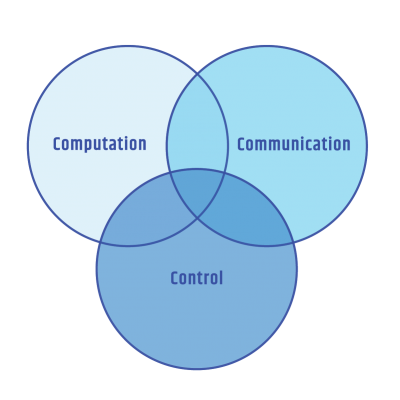Our Academic Mission
To train the engineer of the next decade: the one who is not constrained by disciplines, bridges the gap between theory and application in the field of systems engineering and can transform and disrupt industrial engineering practices. The IASE program of UConn aims to produce these “2020 engineers” at a substantial capacity by adoption of a bold, scalable, interdisciplinary, and modular approach to graduate STEM education that focuses on the application of theory, modern computational methods, state-of-the-art software tools on complex industrial systems.
Why Systems Engineering?

The convergence of computation, communications and control enable cyber-physical systems (CPS) to have learning and predictive capabilities capable of adapting to changing situations. Motivated by the increasing complexity of advanced products and the digital revolution, the IASE trains engineers in urgently needed CPS-related disciplines that are pivotal to innovation and product enhancement in the globally competitive economy. With its industrial base and focus and excellent faculty, the Institute is positioned to advance the science base of CPS and to accelerate its technological translation into sustained industrial growth.
Graduate Certificate Program
Engineers and technical managers learn how systems engineering practices, processes, and methods can be applied to design cyber-physical systems.
Graduates see the “big picture” of systems engineering from an organizational and process viewpoint and can apply basic design methodologies of systems engineering to cyber-physical systems.
Students engage in a multidisciplinary environment promoting experientially-based expertise in model-based systems engineering.
Achieve a depth of knowledge in systems engineering practices and methods to be able to contribute to and expand your company’s systems engineering expertise and capabilities. Graduate certificate comprises 4 courses and can be completed in 1 to 2 years of part time enrollment. Four to six courses are offered every fall and spring semester that allows completion of the certificate quickly.
Master's of Engineering
Achieve a depth of knowledge in systems engineering practices and methods to be able to work as a systems engineer and provide leadership and expertise on the development of your company’s systems engineering processes, functions, and methods. Students can earn the Master’s of Engineering (MENG) degree in Advanced Systems Engineering part-time or full-time.
The program combines technical professional development courses with advanced systems engineering expertise. The Master’s of Engineering in Advanced Systems Engineering comprises 10 courses. For students who have earned the Graduate Certificate in Advanced Systems Engineering, and completed four (4) systems engineering courses, students take six (6) more courses to earn the Master’s degree.
What Next? Next: Differentiation and Expertise